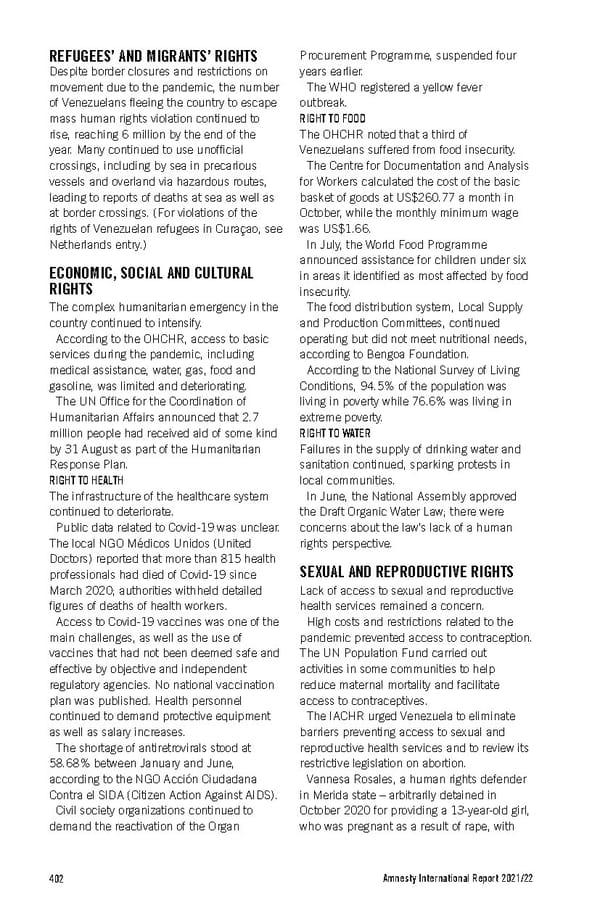Procurement Programme, suspended four REFUGEES’ AND MIGRANTS’ RIGHTS Despite border closures and restrictions on years earlier. movement due to the pandemic, the number The WHO registered a yellow fever of Venezuelans fleeing the country to escape outbreak. mass human rights violation continued to RIGHT TO FOOD rise, reaching 6 million by the end of the The OHCHR noted that a third of year. Many continued to use unofficial Venezuelans suffered from food insecurity. crossings, including by sea in precarious The Centre for Documentation and Analysis vessels and overland via hazardous routes, for Workers calculated the cost of the basic leading to reports of deaths at sea as well as basket of goods at US$260.77 a month in at border crossings. (For violations of the October, while the monthly minimum wage rights of Venezuelan refugees in Curaçao, see was US$1.66. Netherlands entry.) In July, the World Food Programme ECONOMIC, SOCIAL AND CULTURAL announced assistance for children under six RIGHTS in areas it identified as most affected by food insecurity. The complex humanitarian emergency in the The food distribution system, Local Supply country continued to intensify. and Production Committees, continued According to the OHCHR, access to basic operating but did not meet nutritional needs, services during the pandemic, including according to Bengoa Foundation. medical assistance, water, gas, food and According to the National Survey of Living gasoline, was limited and deteriorating. Conditions, 94.5% of the population was The UN Office for the Coordination of living in poverty while 76.6% was living in Humanitarian Affairs announced that 2.7 extreme poverty. million people had received aid of some kind RIGHT TO WATER by 31 August as part of the Humanitarian Failures in the supply of drinking water and Response Plan. sanitation continued, sparking protests in RIGHT TO HEALTH local communities. The infrastructure of the healthcare system In June, the National Assembly approved continued to deteriorate. the Draft Organic Water Law; there were Public data related to Covid-19 was unclear. concerns about the law’s lack of a human The local NGO Médicos Unidos (United rights perspective. Doctors) reported that more than 815 health SEXUAL AND REPRODUCTIVE RIGHTS professionals had died of Covid-19 since March 2020; authorities withheld detailed Lack of access to sexual and reproductive figures of deaths of health workers. health services remained a concern. Access to Covid-19 vaccines was one of the High costs and restrictions related to the main challenges, as well as the use of pandemic prevented access to contraception. vaccines that had not been deemed safe and The UN Population Fund carried out effective by objective and independent activities in some communities to help regulatory agencies. No national vaccination reduce maternal mortality and facilitate plan was published. Health personnel access to contraceptives. continued to demand protective equipment The IACHR urged Venezuela to eliminate as well as salary increases. barriers preventing access to sexual and The shortage of antiretrovirals stood at reproductive health services and to review its 58.68% between January and June, restrictive legislation on abortion. according to the NGO Acción Ciudadana Vannesa Rosales, a human rights defender Contra el SIDA (Citizen Action Against AIDS). in Merida state – arbitrarily detained in Civil society organizations continued to October 2020 for providing a 13-year-old girl, demand the reactivation of the Organ who was pregnant as a result of rape, with Amnesty International Report 2021/22 402
 Amnesty International Report 2021/22 Page 401 Page 403
Amnesty International Report 2021/22 Page 401 Page 403